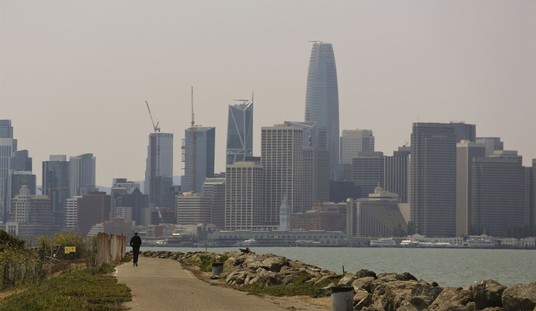The US launched another round of airstrikes against ISIS in Syria, but the diplomatic action may shift to the UN, where Barack Obama is looking to add to his coalition of the willing. The Pentagon announced the new strikes by proclaiming that the US and its current partners are on offense — and like ISIS, aren’t paying much attention to the border between Iraq and Syria:
“It’s an offensive campaign now,” Rear Admiral John Kirby said Wednesday morning on CNN. “We’re not going to be constrained by that border between Iraq and Syria.”
Two strikes targeted an ISIS staging area in Syria near the Iraqi border that was used to move personnel and equipment back and forth across the border, Kirby said.
Kirby said he could not confirm reports that Abu Yousef al-Turki, the leader of the al-Nusra Front, an al Qaeda-linked terror group, was killed in earlier airstrikes.
That would certainly send a message, but it also may mean a wider war. The fight was specifically about ISIS at first, and later the Khorasan chapter of al-Qaeda, which was plotting specifically against the West. The Nusra Front was a rival to ISIS as well as the Assad regime in Damascus; still an al-Qaeda affiliate and not among the so-called “moderate” Syrian rebels, but distinct from ISIS. If we are going after Jabhat al-Nusra as well as ISIS, then we’re weighing in on the Syrian civil war … and in a way that Bashar al-Assad can’t find terribly displeasing, either, since ISIS and Nusra are his two most effective enemies.
So far, none of America’s Western allies have joined the fight in Syria, perhaps in part to avoid that appearance. That could change over the next few days, or at least it might in Iraq. David Cameron is expected to sign up the UK for the offensive against ISIS, but wants a formal request from Baghdad, suggesting that the Brits will remain “constrained by that border”:
Cameron is due to set out his position in a speech to the U.N. General Assembly in New York on Wednesday night at which he will call on the world to unite to destroy Islamic State (IS)militants, whom he has warned are planning to attack Britain.
The decision to strike in Iraq would be at Baghdad’s request. Cameron is due to meet Iraqi Prime Minister Haider al-Abadi on Wednesday. Sources in Cameron’s office expect him to request British air strikes against IS during the meeting.
Turkey, which has been accused of being sympathetic to ISIS in the past, may also finally react to the crisis by at least offering military support, if not participation in the strikes:
On Tuesday, Turkish President Recep Tayyip Erdogan suggested Turkey could join military action against IS.
“We will give the necessary support to the operation. The support could be military or logistics,” he told reporters in New York, where is attending the UN General Assembly meeting.
Note that this isn’t an explicit pledge to conduct airstrikes, but it’s an opening for that possibility. It’s certainly a stronger commitment than Turkey has been willing to make against ISIS up to now, even with more than 150,000 Syrian Kurds pouring across their border as refugees. Turks have more sympathy to ISIS than other NATO countries do, and some of them are going the other direction across the border to live in the “family friendly” environs of the Islamic State, according to the AP:
Ummi Abdullah, originally from Kyrgyzstan, reached the Islamic State group only last month, and her disappearance became front-page news in Turkey after her ex-husband, a 44-year-old car salesman named Sahin Aktan, went to the press in an effort to find their child.
Legions of others in Turkey have carted away family to the Islamic State group under far less public scrutiny and in much greater numbers. In one incident earlier this month, more than 50 families from various parts of Turkey slipped across the border to live under Islamic State, according to opposition legislator Atilla Kart.
Kart’s figure appears high, but his account is backed by a villager from Cumra, in central Turkey, who told AP that his son and his daughter-in-law are among the massive group. The villager spoke on condition of anonymity, saying he is terrified of reprisals.
The movement of foreign fighters to the Islamic State group — largely consisting of alienated, angry or simply war-hungry young Muslims — has been covered extensively since the group tore across Iraq in June, capturing Mosul, threatening Baghdad and massacring prisoners. The arrival of entire families, many but not all of them Turkish, has received less attention.
“It’s about fundamentalism,” said Han, a professor of international relations at Istanbul’s Kadir Has University. The Islamic State group’s uncompromising interpretation of Islam promises parents the opportunity to raise their children free from any secular influence.
“It’s a confined and trustable environment for living out your religion,” Han said. “It kind of becomes a false heaven.”
A false heaven built on the blood of the recent inhabitants, and on the backs of the slaves that ISIS has made of the rest. Erdogan will have to tread carefully in that political environment; the cosmopolitans of Istanbul and Ankara won’t give him much trouble for looking westward, but the southern regions of Turkey may be another issue altogether, especially with the disruption caused by such a huge flood of refugees in such a short period of time.
Obama could use even diplomatic support from Erdogan this week, especially if Cameron comes down foursquare for conducting airstrikes on ISIS targets in Iraq. Right now, as Noah noted earlier, the US is doing almost all of the heavy lifting no matter how many times Obama claims to have a “broad coalition,” and we could use a few friends with their own muscle.








Join the conversation as a VIP Member